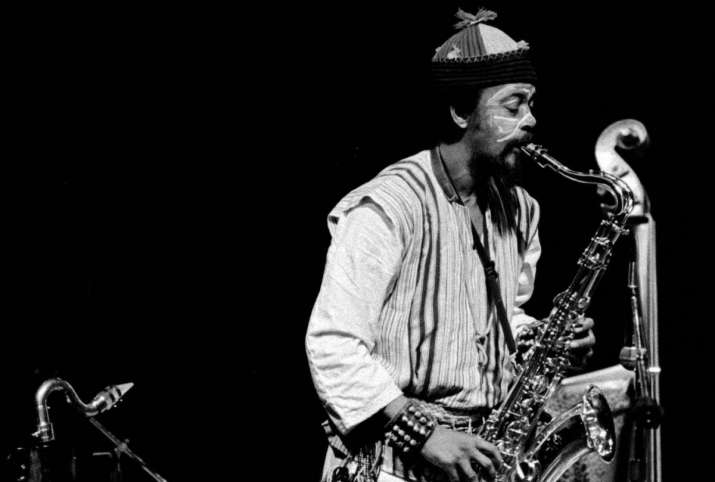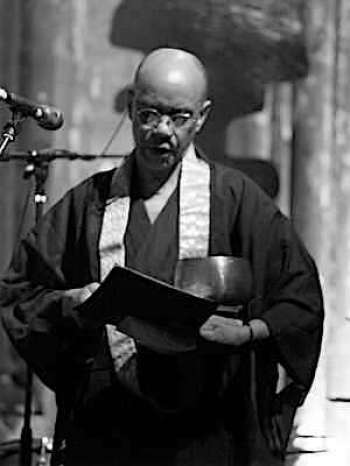Renowne

Joseph Jarman, an iconic free jazz musician and composer and Shinshu Buddhist priest died at the Lillian Booth Actors Home in New Jersey on 9 January at the age of 81. The cause of death was given as cardiac arrest as a result of respiratory failure.
Despite a long and illustrious career as an avant-garde jazz saxophonist, woodwind player, flautist, and percussionist, much of Jarman’s time in the last two decades of his life was dedicated to his work as an aikido instructor and a priest in the Japanese Jodo Shinshu (浄土真宗, also known as Shin Buddhism) tradition of Pure Land Buddhism.
Jarman’s Dharma teachers included the late Reverend Gyoko Saito of Higashi Honganji USA. He also studied Zazen meditation with Zenko Heshiki, Zen priest and Shihan of Chozen-ji Ryu Kempo in Honolulu. In 1990 he was ordained as a Jodo Shinshu priest at Higashi Hongan-ji, a temple in Kyoto, Japan, taking the Dharma name Rev. Shaku Gyo Joseph Jarman. Also in 1990, he co-founded the Brooklyn Buddhist Association with his former wife, the writer and scholar Rev. Thulani Davis, opening the Jikishinkan Aikido dojo in the same building.
Born in Arkansas in 1937, and raised in Chicago, Jarman learned to play the drums under the tutelage of Walter Dyett, whose also taught Nat King Cole and Bo Diddley. During a stint in the army in the 1950s, he picked up the alto saxophone and clarinet, which he played in Chicago after he was discharged in 1958.
Jarman was a founding member of the Association for the Advancement of Creative Musicians (AACM), a nonprofit co-operative with a focus on new music and African-American artists, and the renowned Art Ensemble of Chicago. As a jazz musician, Jarman was revered for his tenure in the Art Ensemble of Chicago, from its inception in the late 1960s until he left in the early 1990s, before rejoining the group in the early 2000s.
Jarmen was also a poet, and his writings were featured in concerts and on recordings—on his 1966 experimental debut album Song For, he recited “Non-Cognitive Aspects of the City.”
From around 1967, Jarman became one of the first saxophonists to perform solo, a move that was also adopted by other members of the AACM. Jarman led his own group from 1966–68, which included bassist Charles Clark, drummer Thurman Barker, and pianist Christopher Gaddy.

In 1967, Jarman recorded for the first time with three other musicians with whom he would go on to form the Art Ensemble of Chicago: Lester Bowie, Roscoe Mitchell, and Malachi Favors. The ensemble became a key part of the experimental music landscape, drawing inspiration from jazz and blues, as well as world music, ritual, and folklore. By 1969, the band would become Jarman’s primary creative outlet, and he continued with the Art Ensemble of Chicago until 1993.
After leaving the ensemble, Jarman virtually retired from music in order to devote himself to his spiritual practice, although he continued to perform and record on occasion.
Speaking in an interview in 1987, Jarman described his work with the Art Ensemble of Chicago: “And this is another thing that was perhaps a bit different from many of our predecessors, the idea of looking for a sound, rather than playing a musical instrument and getting all of the sound out of that. Because each instrument is a different universe, and each instrument does contain of its own-ness a wonderful thing.
“All of this music, this kind of breath, cosmic breath, is flowing, and some people it touches. And if we’re practicing music and we’re open enough and it touches us, then we have to respond.” (ARTFORUM)
Established by the former Tendai monk Shinran (1173–1263), Jodo Shinshu is considered to be the most widely practiced school of Buddhism in Japan. It advocates reliance on the “other power” of Amitabha Buddha, as manifested in his Fundamental Vow, in order to attain liberation.
See more
Joseph Jarman, 81, Dies; Mainstay of the Art Ensemble of Chicago (The New York Times)
Jazz Musician and Buddhist Priest Joseph Jarman Dead at 81 (Pitchfork)
JOSEPH JARMAN (1937–2019) (ARTFORUM)
Joseph Jarman, R.I.P., 1937-2019 (NEPR)
Joseph Jarman
Jikishinkan Aikido Dojo
Higashi Honganji USA
Chozen-ji
The Art Ensemble of Chicago
d multi-instrumentalist and Pure…












